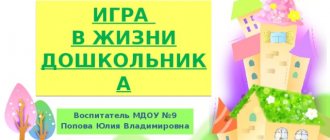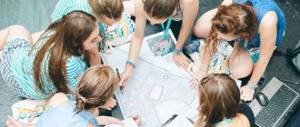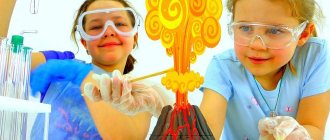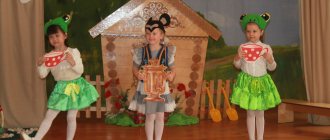Speech development through theatrical activities
Preschoolers are increasingly using gadgets in their daily lives, which are confidently part of modern life. Talking and singing toys, moving pictures on monitors not only inhibit speech development, but also reduce the physical activity necessary at an early age, keeping the baby’s attention in a stationary position.
Matinee
Note! Physical contact with the world is especially important in the preschool period for a child who needs to see the result of his actions in reality.
To develop a child’s emotions and self-awareness, the ability to communicate with people around him and cultivate interest in the processes and various phenomena taking place around him, it is important to create a situational project, a live game.
Role-playing game
Manufacturers offer a huge selection of educational toys and story games. On sale are toy food products, doll furniture and household appliances, sets of professional accessories and much more. All this makes the game situation closer to reality, helps to understand new concepts, develops the life experience necessary at this age, and develops a coherent, conscious manner of speaking.
Game "Shop"
To start the game, the child must imagine an imaginary situation, endow the toy with character and feelings, and come up with a scenario according to which events will develop. But children do not always know the rules of the game, its main essence, so an adult must help them.
Important! Adults should at the initial stage create a game atmosphere, show techniques and actions important for the game, provide their assistance, and suggest the course of development of the plot.
It makes sense for the teacher to formalize his work in lesson notes, which help children get acquainted with a variety of topics and concepts:
- climatic and natural features of the native land;
- traditional professions;
- the characters of various fairy-tale heroes;
- safety rules;
- standards of polite behavior.
Play as the most effective way to influence children
Starting from the junior group of kindergarten, children learn to play didactic games. Round dances are great for early development, when everyone has the opportunity to see the teacher and other participants. Repeating words helps develop memory and speech, enriches the vocabulary with new expressions, and develops situational behavior.
Game with parents
For a round dance game, it is easy to choose a plot from folk tales, characterized by simplicity of texts, multiple repetitions and the ability to accompany each word with an action.
For example:
There is a teremok, a teremok in the field (children raise their hands above their heads in the form of a triangular roof),
Types and use of interactive technologies in preschool education
He is not low, not high (they squat down, stretch out their arms and show a distance of 20-30 cm from the floor).
Or use children's poems that contain many words that lend themselves to theatricalization:
Teddy bear, clubfoot
Walking through the forest (children waddle, imitating the gait of a clubfooted bear),
Collects cones
Sings a song (bend down, collect invisible cones, put them in an imaginary basket).
For your information! A nanny and a teacher can come to the group in the form of familiar fairy-tale characters, book and cartoon characters. Together with them, the children will learn new concepts and give them instructions and advice.
Theater performance
Starting from the middle group of the preschool educational institution, thematic matinees are held for the children, part of which is a performance with the participation of young artists. The teacher conducts didactic classes that contain skills for future independent children's games. “The doll is sick,” “Let’s build a house for Cheburashka,” “Toys are going on vacation,” and many other topics help develop communication skills with peers, the ability to pronounce one’s actions, and the desire to interact in society.
For example, a teacher in the role of a traveling wanderer knocks on imaginary doors. Children, in the role of hospitable hosts, greet the traveler, invite them to enter, treat them, and offer to relax. New twists and turns can arise in the game and previously acquired knowledge can be practiced.
Gradually developing, the games become more complex, and by the time the children graduate from kindergarten, they should be full-scale, developed plots. The role of the educator in them comes down to the position of an observer monitoring the safety of what is happening.
For your information! According to statistics, only 5-7% of preparatory group students can play a full-scale game independently.
Various sources of inspiration can help children find a new way to play:
- significant events (birthdays, holidays, vacations, trips, etc.);
- seasonal changes (street games directly depend on the weather);
- literature (book characters, the desire to continue a favorite fairy tale, playing out the situation described in the book with other characters);
- slides, photos and video materials.
“The influence of theatrical activities on the development of a child’s speech” consultation on the topic
Municipal budgetary preschool educational institution kindergarten of general developmental type "Teremok" with priority implementation of activities for the social and personal development of children
Silchenko Natalia Ivanovna
Consultation for parents
“The influence of theatrical activities on the development of a child’s speech”
Disorders of speech development in children are considered primarily as a communication disorder. Deviations in speech development affect the formation of the child’s entire mental life. Theater and play activities performed jointly with peers and adults have a pronounced psychological impact on the child. Children in a group exhibit individual characteristics, which contributes to the formation of their inner world. In the game, the child’s personality is formed, its potential capabilities and first creative manifestations are realized. In theatrical and play activities, intensive development of cognitive processes and the emotional and personal sphere occurs. Play can change a child's attitude towards himself and the way he communicates with peers. The role that a child gets when playing in the theater can reveal a potential resource in him. Favorite heroes become role models and identification. It is the child’s ability to identify with his favorite image that allows teachers to have a positive influence on children through theatrical activities. Theatrical activities for preschool children include the following sections:
- puppet theater games;
- dramatization games;
— games-performances (performances);
- plane and shadow theaters.
Theatrical activities contribute to the development of speech (monologue, dialogue). It is impossible to provide special professional training to preschoolers, since their respiratory and vocal apparatus is not yet sufficiently developed. It is necessary to strive to ensure that children understand: an actor’s speech should be clearer, more sonorous and expressive than in life. The adult places emphasis on breathing, on articulation, on diction, on intonation or pitch.
In correctional work with children with delayed speech development, it is necessary to focus on their emotional world and cognitive interest.
The role of poetry in children's theatrical games and exercises is great. A poetic text, like rhythmically organized speech, activates the child’s entire body and contributes to the development of his vocal apparatus. The poems are of a training nature for the formation of clear, competent speech.
Children especially like dialogical poems. Speaking on behalf of a certain character, the child is more easily liberated and communicates with his partner. Then you can create a whole mini-performance from the poem and perform it in the form of sketches. In addition, learning poetry develops memory and intelligence.
Creating a play with preschoolers is a very exciting and useful activity. Joint creative activity involves the child in the production process and helps the child overcome communication difficulties.
As a rule, Russian folk tales serve as material for stage adaptation. They carry an activating effect on the child’s speech activity and emotional sphere, perform a lexical-figurative function, form the linguistic culture of the individual, activate and develop the child’s internal auditory memory. The main language functions develop - expressive (verbal figurative component of speech) and communicative (ability to communicate, understand, dialogue). All of the above gives grounds to assert that the use of theatrical activities increases the effectiveness of psycho-correction of delayed speech development in preschool children.
Children subsequently use literary speech patterns memorized during preparation for the performance as ready-made speech material in free speech communication. There is a practical assimilation of the formal and substantive aspects of speech communication.
Dramatizations or individual scenes from a play used in theatrical production are ready-made models of communicative situations.
When distributing roles in the dramatization game, one should take into account the speech capabilities of each child during a certain period of speech therapy work. It is very important to allow the child to perform on an equal basis with others, even with the smallest role, in order to give him the opportunity, while transforming, to be distracted by either a speech defect or to demonstrate correct speech.
It doesn’t matter what role the child plays, what is important is that he creates an image, learns to overcome speech difficulties and speaks freely.
The desire to get the role of a character is a powerful incentive for quickly learning to speak clearly and correctly.
In our kindergarten, each group has special mini-centers for theatrical activities, where there are puppets for tabletop, mitten, glove, shadow and other types of theater: caps and masks for puppet and shadow theaters.
The use of theatrical activities has a positive effect on the development of expressive speech, imagination, and develops all the mental functions of the child. There is a significant increase in speech activity and the communicative orientation of speech, and coherent, dialogic speech develops.
The influence of didactic and theatrical games on the speech development of a preschooler
While acting out the plot, children recreate an imaginary situation. By performing improvised roles, they form the qualities necessary for the development of a full-fledged inner world:
- intelligence;
- imagination;
- the ability to express ideas in words;
- ability to act in the given circumstances;
- desire to communicate with peers.
Speech development through theatrical activities
One possible form of role-playing is participation in the theater. By acting out familiar stories and participating in productions, young artists not only enrich their vocabulary and improve their imagination; thanks to the role, the performer has the opportunity to experience character traits that are unusual for him.
Theater
Note! A coward can play a brave man, and a kid with a poor appetite can play Robin Bobbin Barabek. One actor needs to stop whispering and develop the ability to speak openly and confidently. Some suffer from excessive loudness and with the help of a role they learn not to shout, mastering the power of their voice.
Gymnastics for waking up after sleep for the 2nd junior group of preschool educational institutions
Performing a play broken into lines forces all the actors to watch what is happening so as not to miss their words. This teaches you to be attentive to the conversation of your interlocutor, not to interrupt, and to follow the general flow of the conversation.
Why does theatrical activity contribute to the development of speech? Theater classes greatly influence the development of a child’s articulatory apparatus. Through rehearsals, the unclearness of pronounced sounds, the slurredness of words used, and the inability to speak loudly enough are corrected.
Important! Learning roles helps to express thoughts coherently and makes children's speech more vivid and emotionally charged.
The development of speech in the older group through theatrical activities can be carried out using different types of dolls:
- standing;
- fingered;
- puppets;
- gloves
The movements of the fingers and hands themselves contribute to the improvement of fine motor skills and, as a result, the development of the speech apparatus; the child increases his ability to concentrate. The words must match the actions of the dolls.
The stage of a puppet theater is always much smaller than the space intended for the theater of living people. Therefore, young artists are very close to each other. Any thoughtless movement can destroy the scenery or interfere with the performance. In such conditions, the ability to coordinate one’s actions, be patient and attentive is developed.
puppet show
Theatrical activities as a means of developing speech in preschool children
Ekaterina Aprelkova
Theatrical activities as a means of developing speech in preschool children
Prepared by teacher: Aprelkova E.V.
Report on the topic: Theatrical activities ,
as a means of developing speech in preschoolers
One of the most effective means of developing and educating a child in early preschool age is theater and theatrical games , since play is the leading activity of preschool children , and theater is one of the most democratic and accessible forms of art, which allows solving many pressing problems pedagogy and psychology related to artistic and moral education, the development of personal communicative qualities, the development of speech , imagination, fantasy, initiative, etc.
Early preschool age is the most favorable period for the comprehensive development of a child . At 3-4 years old, children actively develop all mental processes: perception, attention, memory, thinking, imagination and speech. During this same period, the formation of basic personality qualities occurs. Therefore, none of the children's ages requires such a variety of means and methods of development and education as the younger preschool age .
The educational possibilities of theatrical activities . By participating in it, children get acquainted with the world around them through images, colors, sounds, and skillfully posed questions force the children to think, analyze, draw conclusions and generalizations. of speech is also closely related to mental development . In the process of theatrical play, the child’s vocabulary is imperceptibly activated, the sound culture of his speech and its intonation structure are improved. The role played and the spoken lines put the child in front of the need to express himself clearly, distinctly, and intelligibly. His dialogic speech and its grammatical structure improve.
Theatrical activity is a source of development of feelings , deep experiences of the child, and introduces him to spiritual values. They develop the child’s emotional sphere, make him sympathize with the characters, and also allow him to develop the experience of social behavior skills due to the fact that every literary work or fairy tale for preschool always has a moral orientation. Favorite heroes become role models and identification. It is the child’s ability to identify with his favorite image that has a positive impact on the formation of personality traits.
In addition, theatrical activities allow the child to solve many problematic situations indirectly on behalf of a character. This helps overcome timidity, self-doubt, and shyness.
Children's acquaintance with the theater begins from early preschool age .
It is at this age that interest in theatrical games , which develops in the process of watching small puppet shows that teachers show, taking as a basis the content of nursery rhymes, poems or fairy tales familiar to the child.
It is as follows: teachers encourage children to communicate (the game “Who are we?”
,
“Tell me your name”
, nursery tale
“Kitsonka-Murysonka”
, A. Barto
“Horse”
,
“Walk in the Forest”
).
They teach children to find expressive means in the intonation of the logic of speech (showing the fairy tale “Teremok”
, where children’s attention was drawn to imitation of animal voices).
They teach children to pronounce phrases emotionally, to clearly pronounce sounds ( “A Walk in the Woods,”
where they taught ideas about how the wind rustles, leaves fall, and rustles underfoot).
Children learn to pronounce onomatopoeic words with different intonations, develop speech breathing (after guessing riddles about animals, children imitate the voice of the guessed animal, the game “Raven and Little Crows”
(the wind blows in winter, take a deep breath through your nose and puff out your cheeks, exhale forcefully). They teach children logically expressively pronounce words in pure phrases, changing the strength of the voice (sa-sa - here is a wasp flying with different strength of voice, quietly - louder - louder, changing intonation: surprised, questioning, scared, Sha-sha-sha-our porridge is good, etc. .).
The most accessible types of theater for younger preschoolers are finger and puppet theaters .
There are several classifications of puppet theater games for preschool children .
- tabletop puppet theater : flat (figurines made of cardboard, thick paper, plywood, sewn (from pieces of fabric, fur, leather, foam rubber, knitted (crocheted or knitted from various types of yarn so that they keep their shape, they are put on plastic bottles or children's skittles, molded (made of clay like the Dymkovo toy, wooden carved (like the Bogorodskaya toy), foam plastic, boxes, natural materials, conical, papier-mâché, and also the base of a tabletop doll can be a cylinder, cube, pyramid.
stand theater (flannelgraph, shadow, magnetic stand, stand-book)
;
theater on the hand (finger, pictures on the hand, mitten, glove, shadow theater );
puppet theater (made of papier-mâché, foam rubber, polystyrene foam, fabric, fur on the principle of a soft toy, movements are reproduced using a vaga - a cross to which the doll is attached using threads
live hand puppet theater
. These dolls have bright, expressive capabilities and can perform actions that are unusual for dolls of other systems. They consist of a head, a loosely hanging cloak, into the cuffs of which the child inserts his hands.
Dolls on canes (the basis of such a doll is the gapit - a wooden rod on which the doll is attached. The gapit is the “spine”
dolls A shoulder frame is installed on it. The doll's arms are moved by canes attached to the doll's hands.
dolls of the “people-dolls”
.The child puts on a costume: a huge head - a mask, large hands, huge boots - and turns into a living doll. The head, palms, boots are made of foam rubber and covered with fabric. People-dolls have bright stage capabilities. Controlling such dolls gives children great joy.
Finger theater - promotes the development of speech , attention, memory, forms spatial concepts, develops dexterity , accuracy, expressiveness, coordination of movements, increases performance, tone of the cerebral cortex. The point of this theater is to encourage the child to put figurines on his fingers and try to tell fairy tales (different, but always based on the original text)
.
Stimulation of the fingertips, among other things, leads to the development of speech .
Thus, we can conclude that theatrical activities make it possible to use them as a strong, but unobtrusive pedagogical means of speech development , because the child feels relaxed and free during theatrical games.
Master class on speech development through theatrical activities
The development of speech through theatrical activities is often used according to the standards of the Federal State Educational Standard in the format of a rhythmic part or a physical education session between other classes.
For example, kids love poems about animals:
The gray bunny is sitting (children squat),
He moves his ears, like this, like this (they raise their arms above their head and move them).
It’s cold for the bunny to sit, we need to warm our little paws, clap, clap (they get up, hug themselves with their arms, clap),
It’s cold for the bunny to stand, the bunny needs to jump, jump and jump (they jump on one leg, on the other, on both legs together).
Oh, you little owl, you’re a big head (they show with their hands how big your head is),
You were sitting on a tree, you were turning your head (turning your head).
She fell into the grass and rolled into a hole (they squat down, then fall on their backs and wave their arms and legs in the air).
Theater activities in kindergarten
Performing acting roles makes a huge contribution to the development of children's speech. According to statistics, most preschoolers enjoy participating in productions. Therefore, in children's educational institutions, the educational program includes various areas based on theatrical games.
The following types of theatrical performances are distinguished:
- Imitation. The child portrays already existing fairy tale heroes. Trains to convey the emotions of the characters. Learns to act according to a pre-planned scenario.
- Improvisation. The general theme of the game is set. The child thinks out the rest himself. He acts as an actor, director and screenwriter at the same time.
Through theatrical activities, not only speech develops, but also the child’s general mental and mental abilities. He becomes more observant, independent and self-possessed. More often shows imagination and creativity in life situations.
How to introduce your child to the theater
Theater is an amazing form of leisure, interesting for the whole family. The tradition of holding home performances will definitely find a response in a child’s soul. Adults can act out a fairy tale at a birthday party or, together with their children, organize a theatrical performance for grandma. In winter it is interesting to show a shadow theater, and in the summer you can fold paper characters using the origami technique and take them with you to the dacha.
Theatergoers
The main secret is simple - all children want and love to do what their parents do. The sincere interest of adults, their participation and genuine interest in what is happening will help the child learn to speak beautifully and competently.







